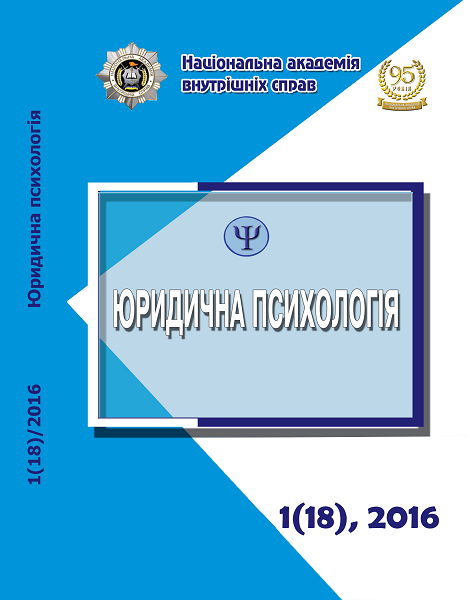Role of Crisis Intervention in the System of Psychological Assistance Participants of Military Operations
Keywords:
post-traumatic syndrome, crisis intervention, eco facilitation approach, identity, integrative model
Abstract
The article considers features of a crisis intervention as an initial step of psychological assistance to participants of military operations. Was defined the essence of post-traumatic syndrome. Described features of a crisis intervention: promoting the expression of strong emotions; reducing negative feelings through the process of repetition; opening access to disquisition acute problems; forming an understanding of topical issues to support the client; providing a basis to acceptance of experience lived through. Disclosed content features of the main stages of crisis intervention: information gathering, formulation and reformulation of problem; search for alternatives in problem solving. Grounded content of client assistance in the following areas: identification of feelings and combination them with the content of situation; completing research of the problem together with client; identification of events that caused post-trauma; separation «historical» problems from the current situation; determining the resources to deal with the problem. Determined specifics of use various psychotherapeutic directions in conditions of post-injury. Advantages of an integrated approach in system of psychotherapeutic work were grounded. Priority of interactive models determined by the specific of psychotherapeutic work in post-trauma conditions, that is compliance flexible application of the various principles and approaches. Depending on what takes priority in clarifying the causes of internal personal conflict in terms of post-injury, set focus analysis from positions of psychodynamic, cognitive-behavioral and phenomenological (humanistic) approaches. Integrative psychotherapy approach allows re-develop a global model of personality in terms of post-injury, based on the different types of personal change. Outlined directions of realization of an integrated approach to psychological support participants of military operations through the following tasks: education that promotes awareness of clients to their problems; prevention, aimed at promoting healthy lifestyles and creating conditions for effective rehabilitation; social (family and group therapy, support from civic organizations, psychotherapy (treatment of neuroses, phobias, psychosomatic disorders, etc.). Evaluating the effectiveness of psychological assistance is based on analysis of the scope and quality of the changes that have taken place with participants of military operations during therapeutic communication, as well as in real life. It is important to take into account the interaction of cognitive, emotional and behavioral mechanisms of the client personal growth in the processing of post-injury.Downloads
Download data is not yet available.
Abstract views: 294 PDF Downloads: 825
Issue
Section
Theoretical and methodological issues of legal psychology
- Authors reserve the right to authorship of their own work and transfer to the magazine the right of the first publication of this work under the terms of the Creative Commons Attribution License, which allows other persons to freely distribute published work with mandatory reference to authors of the original work and the first publication of an article in this magazine.
- Authors have the right to enter into separate additional agreements on non-exclusive dissemination of the work in the form in which it was published in the journal (for example, to post an article in the institution's repository or to publish as part of a monograph), provided that the link to the first publication of the work in this journal is maintained.
- The journal's policy allows and encourages the posting of articles by authors on the Internet (for example, in electronic storehouses of institutions or on personal websites), both before the submission of this manuscript to the editorial office and during its editorial processing, as this contributes to the creation of a productive scientific discussion and positively affects the efficiency and dynamics of citing the published work.




